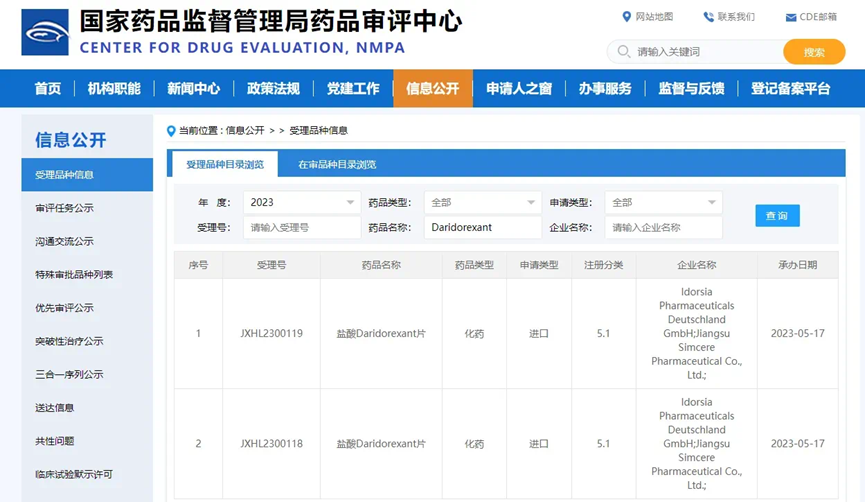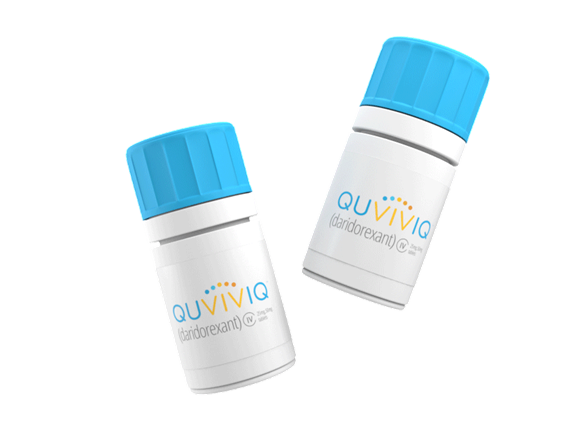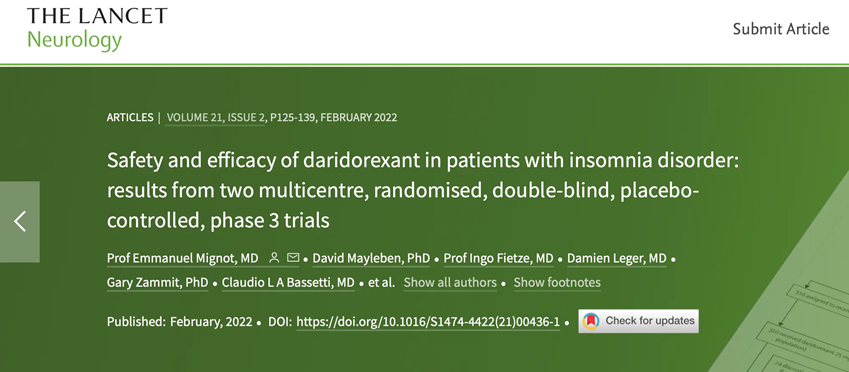On May 16, 2023, the investigational new drug (IND) application for the new anti-insomnia drug, daridorexant, jointly developed by Simcere (2096.HK) and Idorsia (Switzerland) has been accepted by the Center for Drug Evaluation (CDE) of the National Medical Products Administration for the treatment of adult patients with insomnia. The overseas phase III clinical data showed that after receiving treatment for 1 month and 3 months, compared with the placebo group, patients in the daridorexant group fell asleep faster, had nocturnal sleep increased by nearly 1 h, and had better mental state during the daytime. Furthermore, no evidence of drug tolerance, drug dependence, rebound insomnia, withdrawal symptoms, or drug abuse was found.

Insomnia is a disease that causes widespread concerns at present, clinically characterized by difficulty initiating sleep and/or difficulty maintaining sleep. Population suffering from insomnia have a strong demand for innovative drugs that can increase sleep quantity and quality and improve daytime functioning.
Daridorexant is a dual orexin receptor antagonist (trade name: QUIVIVIQ). With a different mechanism of action from that of traditional anti-insomnia drugs, daridorexant has higher target selectivity. By antagonizing orexin receptors, daridorexant decreases the wake drive and allows sleep to occur, without altering the sleep architecture of patients.

Daridorexant is developed by Idorsia, a leading biopharmaceutical company in Switzerland. Daridorexant has been approved by U.S. Food and Drug Administration (FDA), European Medicines Agency (EMA), and Swissmedic, respectively, and has been marketed in the U.S., the U.K., and Switzerland, being the first dual orexin receptor antagonist approved in Europe. In November 2022, Simcere signed an exclusive license agreement with Idorsia, obtaining the exclusive rights to develop and commercialize daridorexant in Greater China region (China Mainland, Hong Kong, and Macao).
Comprehensively improving sleep quality
In February 2022, the overseas phase III clinical data of daridorexant were published in The Lancet Neurology. The study results showed that daridorexant can improve sleep quality in a comprehensive way. In the first and third months of treatment, patients in the daridorexant group exhibited significant improvement in sleep onset, sleep maintenance, and total sleep time compared with the placebo group.

In the third month of treatment for subjects receiving daridorexant 50 mg, the latency to persistent sleep (LPS) significantly decreased by 34.8 min, the wake after sleep onset (WASO) significantly decreased by 29.4 min, and the subjective total sleep time (sTST) significantly decreased by 57.7 min. As calculated accordingly, the sleep time increased by nearly a full night per week for patients receiving daridorexant.
Effectively improving daytime functioning
Daridorexant has also been found to have significant advantage in effectively improving daytime functioning, and it is the only anti-insomnia drug with such effect approved by the EMA. Daytime functioning may involve daytime somnolence, fatigue, mental or emotional state, and cognitive function. The overseas phase III clinical data of daridorexant showed that the 50 mg dose group exhibited a statistically significant improvement in terms of daytime somnolence domain in the first and the third months of treatment as evaluated using the Insomnia Daytime Symptoms and Impacts Questionnaire (IDSIQ) developed and validated according to the industry guidelines of the U.S. FDA.
In addition, the phase III clinical study data also showed good drug safety, and the safety in the 9-month extension study was consistent with that in the key phase III study. The overall incidence of adverse events was low and comparable among treatment groups, and no evidence of drug tolerance, drug dependence, rebound insomnia, or withdrawal symptoms was observed.
It is expected to receive the clinical trial notification letter of daridorexant from the CDE in August 2023. Simcere will further accelerate the R&D to make more effective drug therapies available to patients soon, bringing better treatments to Chinese patients with insomnia.